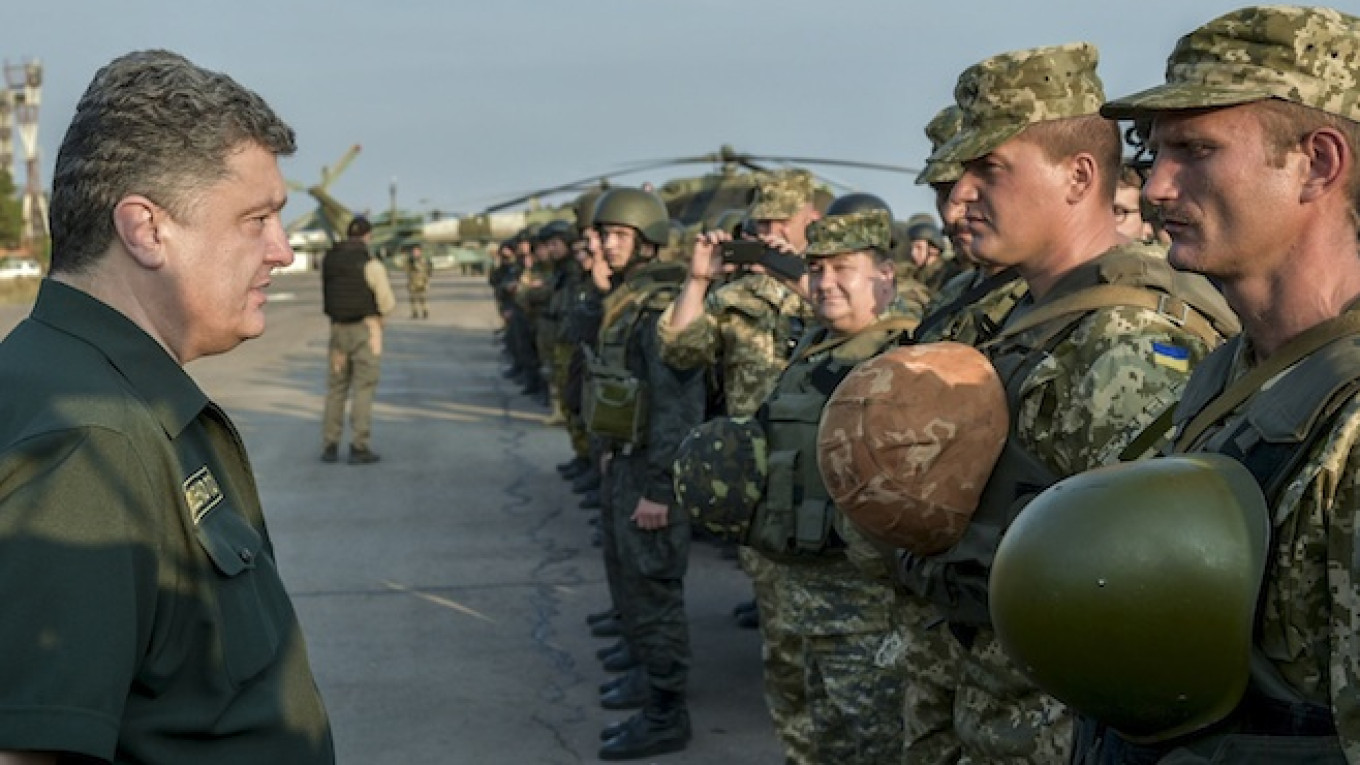MARIUPOL/DONETSK, Ukraine‚ Ukrainian President Petro Poroshenko has visited the eastern port of Mariupol, promising to deal a "crushing defeat" to pro-Russian rebels massed on the edge of town if they tried to advance in violation of a cease-fire agreement.
"I have ordered [the military] to secure the defense of Mariupol with howitzers, multiple rocket launchers, tanks, anti-tank weapons and air cover," Poroshenko said Monday in the port on the Sea of Azov near the Russian border.
The cease-fire, which took effect Friday evening, is part of a peace plan intended to end a five-month-old conflict the United Nations' human rights envoy said had killed more than 3,000 people. It has also caused the sharpest confrontation between Russia and the West since the Cold War.
The truce was largely holding on Monday, though each side accused the other of sporadic shelling, including in Mariupol, a city of about half a million, shortly after the president's arrival there.
The Organisation for Security and Cooperation in Europe (OSCE), which is monitoring the cease-fire, urged the two sides to seek a political "breakthrough," though they remain far apart on the future of eastern Ukraine, home to much of the country's heavy industry. The rebels refuse to accept rule from Kiev.
"Mariupol was, is and will be Ukrainian," Poroshenko declared.
"The enemy will suffer a crushing defeat," said Poroshenko, who agreed to the cease-fire and a wider peace plan after the rebels — backed, Kiev says, by Russian firepower — made sweeping battlefield gains. Russia denies involvement.
In the earlier days of the uprising, rebels seized control of part of Mariupol, occupying some buildings including a police station. Some offices were badly damaged or burnt down. Since the rebels were driven out by Ukrainian forces, sentiment appears to have swung more in favor of the government.
Residents built fortifications around the town, whose port is vital for Ukraine's steel exports, and set up a militia. Shops have reopened and Ukrainian flags are widely visible.
Mariupol was the scene of fierce fighting before the cease-fire, when rebels advanced in an attempt to retake it, and also saw the most serious violation of the cease-fire on Saturday night when government forces there came under artillery attack.
A woman was killed and four people injured in that shelling.
The cities of Donetsk and Luhansk, strongholds of the rebellion, remain in rebel hands.
Sanctions
Earlier, Ukrainian military spokesman Andriy Lysenko told a news briefing in Kiev that Ukrainian forces were observing the cease-fire except in self-defense and had remained in their positions since Friday evening.
In rebel-held Donetsk, eastern Ukraine's industrial hub, "prime minister" Alexander Zakharchenko of the self-proclaimed Donetsk People's Republic made similar accusations against the Ukrainian side, adding: "We have shown the whole world we are not terrorists, we are ready for talks and we can listen."
Kiev and its Western backers accuse Russia of sending troops across the border and arming the rebels, charges Moscow denies.
Lysenko said on Monday Ukraine had seen no sign of Russian troop movements over the border in the past 24 hours.
A Kremlin statement said Russian President Vladimir Putin spoke by phone on Monday with Poroshenko on "steps that will facilitate a peaceful resolution to the situation,"without giving further details.
Russian Prime Minister Dmitry Medvedev said Moscow would respond to any new Western economic sanctions imposed over its role in Ukraine, adding it might target flights over Russia.
The EU is planning to put Russia's top oil producers and pipeline operators Rosneft, Transneft and Gazprom Neft on its list of state-owned firms that will not be allowed to raise capital or borrow on European markets, an EU diplomat said.
In general, the EU sanctions on raising money in the EU for Russian companies will apply to firms that have turnover of more than 1 trillion rubles($26.95 billion), at least half of it generated from the sale or transport of oil, the diplomat said.
But EU governments delayed signing off on the package because some governments want to discuss how to suspend the sanctions if a cease-fire holds, diplomats said.
EU sanctions do not encompass the gas sector and in particular state-owned Gazprom, the world's biggest gas producer and the biggest gas supplier to Europe.


